Introduction
Legal dramas have long held a prominent place in popular culture, captivating audiences with their riveting portrayals of courtroom battles, legal maneuvering, and the complexities of justice. From iconic TV shows like “Adaalat” to cinematic masterpieces like “A Few Good Men,” these narratives often serve as a lens through which the public views the legal system. The allure of legal dramas lies in their ability to weave suspenseful plots around legal procedures, creating a compelling narrative that transcends the confines of reality. However, this captivating storytelling comes with a caveat. The impact of media portrayals on the public’s perception of the legal system is profound. These depictions, while entertaining, can shape public expectations, instill misconceptions, and influence attitudes towards the legal profession. As we delve into the realm of legal TV shows and movies, it becomes crucial to critically examine their accuracy and understand the implications of these dramatized narratives on our collective understanding of the law[1].
Accuracy vs. Dramatization
In the realm of legal storytelling, a delicate dance unfolds between accuracy and dramatization. While legal dramas are crafted for entertainment value, it is paramount to strike a balance that maintains the integrity of legal processes. The need for gripping narratives often leads to dramatization, manifesting in intensified courtroom confrontations, sudden revelations, and unconventional legal strategies. However, this embellishment must not overshadow the essence of reality. Acknowledging the necessity of entertainment value, it becomes imperative to underscore the importance of portraying legal proceedings realistically. Balancing accuracy ensures that audiences are both entertained and informed, fostering a nuanced understanding of the legal world. Straying too far into dramatization risks distorting the public’s perception of legal processes, potentially giving rise to misconceptions. Therefore, as consumers of legal media, recognizing this delicate equilibrium is key to appreciating the artistry of storytelling while respecting the authenticity of the legal profession[2].
Misleading Aspects
In the realm of legal dramas, the compression of timelines stands as a common deviation from reality. TV shows often condense complex legal proceedings into succinct narratives to heighten tension and sustain viewer engagement. While this compression is a narrative necessity, it inherently deviates from the more extended and meticulous timelines characteristic of actual legal processes. In reality, legal cases unfold over weeks, months, or even years, involving thorough investigations, evidence gathering, and procedural steps that differ significantly from the rapid-fire pace seen on screen. This distortion, while enhancing dramatic effect, risks creating a misleading impression of the efficiency and speed inherent in the legal system. Moreover, courtroom scenes are often imbued with theatrical flair for entertainment purposes, presenting a second facet of misleading portrayals. Exaggerated confrontations, impassioned speeches, and surprise revelations contribute to gripping storytelling but may diverge significantly from the decorum and formality observed in real-world courtrooms. These dramatizations can foster misconceptions about legal professionals’ behavior, courtroom dynamics, and the nature of legal argumentation. Striking a balance between entertainment and accuracy is crucial, as these misleading aspects can shape public perceptions and contribute to a distorted understanding of the intricacies involved in legal practice. As consumers of legal media, it is essential to discern between creative license and realistic representation[3].
Common Tropes and Stereotypes
The “maverick lawyer” archetype, omnipresent in legal dramas, often deviates markedly from the typical legal professional. While captivating, this portrayal tends to emphasize individualism and rule-bending, traits contrary to the collaborative and rule-abiding nature of real-world legal practice. Maverick lawyers frequently operate on the fringes of ethical and procedural norms, navigating legal challenges in unorthodox ways that might captivate audiences but seldom mirror the nuanced reality of legal work. This dramatization risks oversimplifying the legal profes)sion, overshadowing the teamwork, adherence to protocol, and ethical considerations integral to legal practice. Similarly, the recurring theme of last-minute evidence revelations, while a staple for suspense, diverges significantly from the meticulous and preplanned nature of legal proceedings. In reality, the introduction of evidence is a carefully orchestrated process, subject to rules and deadlines. Depicting eleventh-hour revelations may create a thrilling narrative, yet it perpetuates a misconception about the spontaneity and unpredictability of legal strategies. Distinguishing between creative license and the practical realities of legal practice is crucial to appreciating the artistry of storytelling without misconstruing the professionalism inherent in the legal profession.
Realistic Legal Shows
Amidst the sea of dramatized legal portrayals, certain TV shows stand out for their commitment to realism in depicting legal proceedings. “Criminal Justice” has been widely acclaimed for its attention to legal detail, accurately portraying courtroom dynamics, case preparation, and ethical dilemmas faced by legal professionals. The show’s writers consult legal experts, contributing to a narrative that aligns closely with actual legal practice. Similarly, “Law & Order” has earned praise for its commitment to realism, drawing inspiration from real criminal cases and featuring both the investigative and courtroom phases. The show’s dedication to authenticity is evident in its reliance on legal consultants and meticulous research, offering viewers a more accurate glimpse into the complexities of the legal system. These shows prioritize accuracy by consulting legal experts, conducting thorough research, and showcasing the multifaceted nature of legal work. By doing so, they bridge the gap between entertainment and education, providing audiences with a more authentic portrayal of the legal profession.
Impact on Public Perception
Media portrayals wield significant influence over public perceptions of the legal system, shaping how individuals understand and interpret the complexities of law. Television shows and movies often present sensationalized versions of legal proceedings, contributing to the formation of widespread misconceptions. The consequences of these inaccuracies are multifaceted. Firstly, they may foster unrealistic expectations among the public, leading to disappointment when real legal processes do not align with the dramatized versions. Secondly, misconceptions can erode trust in the legal system, as viewers may perceive reality through the lens of fictionalized portrayals. This lack of faith can impact civic engagement and compliance with legal processes. Moreover, distorted perceptions may contribute to societal misunderstandings of legal professionals’ roles, ethical standards, and the overall functioning of the justice system. As a result, the importance of media literacy in distinguishing between entertainment and reality becomes crucial for fostering a more informed and accurate understanding of the legal system[4].
Conclusion
In the dynamic realm of legal television and film, the interplay between entertainment and accuracy emerges as a central concern. Although dramatization is inherent in storytelling, its power to shape public perceptions and instill widespread misconceptions about the legal system is undeniable. The depiction of maverick lawyers, last-minute evidence twists, and compressed timelines may captivate audiences, yet these elements risk distorting the intricate reality of legal practice. Amidst the multitude of dramatizations, standout shows like ‘Criminal Justice’ and ‘Law & Order’ prioritize authenticity, offering a truer reflection of the legal profession’s complexities. The repercussions of such misconceptions extend beyond entertainment, impacting public trust, civic participation, and societal comprehension. Navigating this landscape responsibly demands a commitment to media literacy, empowering audiences to distinguish between entertainment allure and the realities of the legal system. By fostering such awareness, we can cultivate a more informed and nuanced public understanding of the legal sphere.
[1] As Seen on TV? Just how accurate are legal TV shows?(JERRY BERRY P.A.) http://www.jerryberrylaw.com/how-accurate-are-legal-tv-shows
[2] How Accurate Are TV Legal Dramas?( The University of Texas Permian Basin) https://online.utpb.edu/about-us/articles/political-science/how-accurate-are-tv-legal-dramas/
[3] The Truth in Legal Fiction(LEAH DUNCAN, ERIN PETERSON, AND NATE SVOGUN) https://news.law.fordham.edu/blog/2019/01/22/the-truth-in-legal-fiction/
[4] The Impact of Film and Television on Perceptions of Law and Justice: Towards a Realisable Methodology(Peter Robson) http://surl.li/ohdwr

Lexosphere
Unleash the power of legal knowledge

